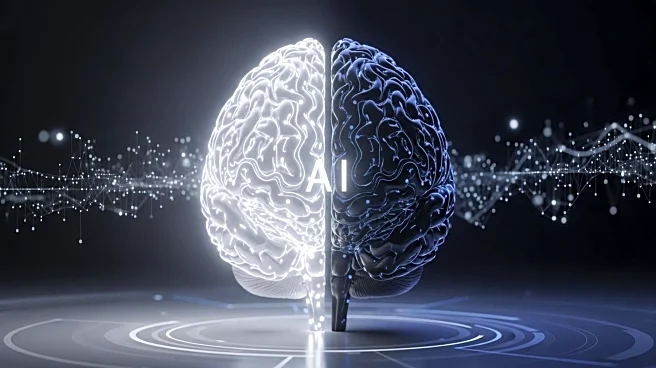What's Happening?
LatentView Analytics is focusing on AI literacy as a critical factor in workforce development. CEO Rajan Sethuraman highlights the importance of training employees in both technical and human skills to adapt to the growing influence of AI. The company has observed an 800% increase in generative AI roles in non-tech sectors since 2022, indicating a significant demand for adaptability. Remadevi Thottathil, CHRO at LatentView, notes the resurgence of humanities and behavioral sciences in guiding AI systems, emphasizing the need for creative thinking alongside technical skills. LatentView has revamped its learning strategy, incorporating AI-powered Analytics Bootcamp and virtual sessions to enhance employee skills and client acquisition.
Why It's Important?
The emphasis on AI literacy by LatentView Analytics underscores a broader trend in workforce development, where understanding and utilizing AI is becoming essential. This shift impacts various sectors, including technology, retail, and legal, where AI-driven platforms are enhancing efficiency and decision-making. Companies that invest in AI literacy are likely to gain a competitive edge, as they can better adapt to technological advancements and meet the evolving demands of the market. The focus on AI literacy also highlights the need for a balanced approach, integrating technical skills with creative and strategic thinking.
What's Next?
LatentView Analytics plans to continue its focus on AI literacy by expanding its training programs and helping Fortune 500 firms establish global capability centers. These initiatives aim to ensure that employees are equipped with both technical and cultural skills necessary for effective AI integration. As AI continues to evolve, companies may need to further adapt their strategies to keep pace with technological advancements and maintain their competitive position in the market.
Beyond the Headlines
The push for AI literacy raises ethical and cultural considerations, as companies must navigate the balance between automation and human judgment. The integration of AI in decision-making processes could lead to shifts in workforce dynamics, requiring new approaches to employee training and development. Additionally, the reliance on AI-readable resumes and screening systems may impact hiring practices, potentially altering the criteria for candidate selection.










